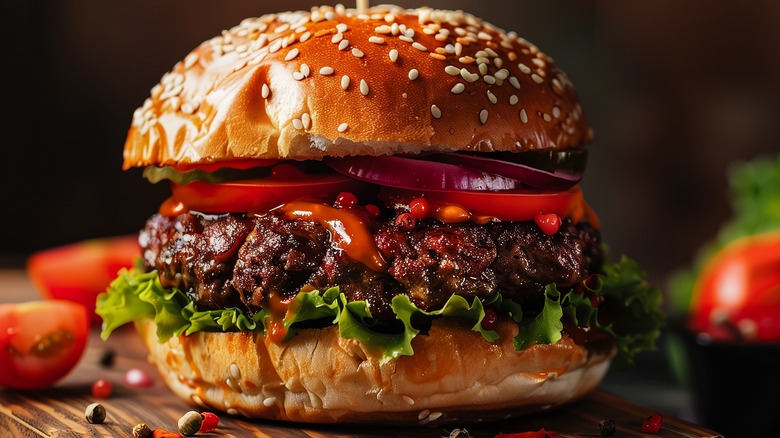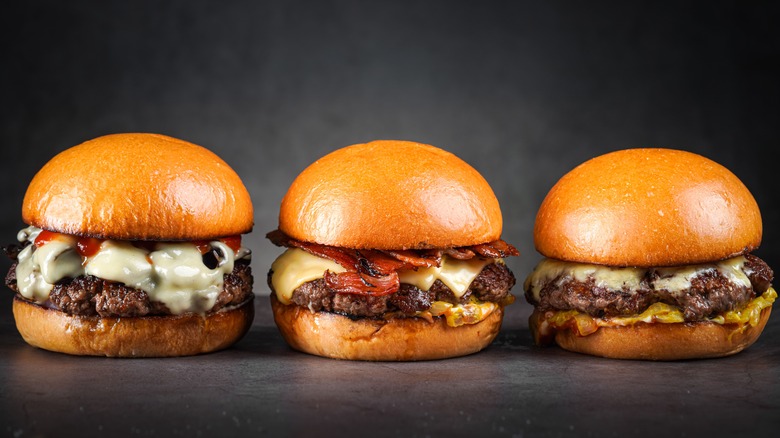Why Calling Hamburgers 'Burgers' Is Actually Incorrect
There's no denying that the hamburger is one of the most famous foods in existence today, with news of its deliciousness reaching the very farthest corners of the globe. According to Zippia, McDonald's alone is thought to sell a whopping 75 hamburgers worldwide, every single second. What isn't so clear is why this beloved bun and pattie combo became known as a 'burger' — considering that linguistically, the term is technically incorrect.
The original word for this fast food fave came about by combining the noun 'Hamburg' and the suffix '-er' (more on how that happened in a moment), which has over time been wrongly broken into two new words ('Ham' and 'burger'). This is a process linguists call rebracketing, and helps explain why hamburgers have such an odd name despite the fact they've never contained ham. Shortening this word, wrong as it may be, was always going to be a natural next step.
Other rebracketed words include helicopter – a combination of 'helico' (meaning spiral) and 'pter' (meaning wings), which has been split into the words 'heli' and 'copter' — and labradoodle, which started out as a combination of 'Labrad' (referring to Labrador retriever) and 'oodle' (referring to 'poodle') but was instead broken into 'Labra' and 'doodle.' Goldendoodle, Dalmadoodle, and Bernedoodle soon followed ... is your head spinning yet? Well, the burger's beginnings offer plenty to chew on.
Tracing 'burger' back to Hamburg
To better understand how the word 'burger' came to be, we must first look to the German city of Hamburg, where in the same way people who live in New York are called New Yorkers and people from Texas are labelled Texans, the locals here were once referred to as Hamburgers (a term coined in the 1610s, according to the Online Etymology Dictionary).
However, that's not the only link this city has to the beloved hamburger. By the 19th century, Hamburg had earned a reputation for producing exceptional beef. According to Andrew F. Smith in his book "Hamburger: A Global History," a common way to prepare this meat was to "chop it, season it and form it into patties" and so, the basis of the modern hamburger was born.
Due to the expensive nature of Hamburg beef, these patties were initially only enjoyed by people living in northern Germany. However, word of their creation soon spread to wider Europe, the United Kingdom, and even North America, with Smith noting that "recipes for making these patties with any type of beef were published in many nineteenth-century cookbooks." Over time, cooks put their own unique spins on the dish, adding onion, garlic, and other types of meat. By the late 19th century, these ground beef creations were known collectively as 'Hamburg steaks' or 'Hamburger steaks' (confusing in itself, given that the patties had about as much in common with steak as they did with ham).
How 'Hamburger steaks' came to be know as 'burgers'
Whoever's bright idea it was to combine a Hamburger steak with a bun to create the hamburger we know today is still open for debate, but what we do know is that this dish exploded in popularity toward the beginning of the 20th century, with the 1904 St. Louis World's Fair credited for first putting it in the public eye. This was followed some years later by the founding of White Castle in 1921, McDonald's and In-N-Out Burger in 1948, Burger King in 1954, and Wendy's in 1969.
With popularity inevitably comes familiarity, so it's no surprise that the term 'Hamburger steak' was soon shortened to 'hamburger.' This of course wasn't quite the end of the semantic gymnastics here, with the even more succinct and now infamous 'burger' following suit in the 1930s.
Around this time, prefixes were also added to the word 'burger' to give a more accurate description of its contents (the word 'cheeseburger', for example, was officially trademarked by a Denver drive-in in 1935, while 'vegeburger' came into use from 1940. 'Bacon-', 'chicken-', 'turkey-', and a smorgasbord of other prefixes were added further down the track).
Linguistically speaking, we now know that all of these terms are incorrect. However, ordering a 'chickenhamburger' and fries the next time you're at one of McDonald's many locations doesn't have quite the same ring to it (and might even earn you a few confused looks from the person behind the counter).


